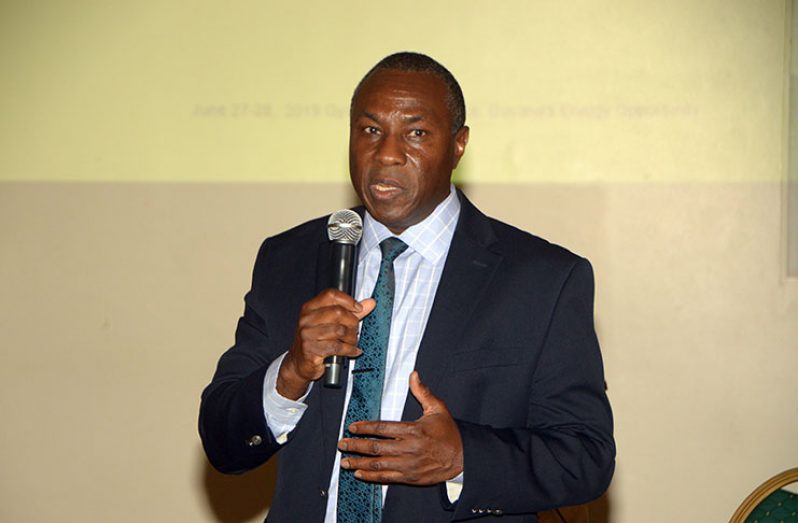THE Guyana Oil and Gas Energy Chamber (GOGEC) on Thursday hosted an Oil and Gas and Energy Business Training Conference geared at building capacity in interested entities.
The two-day conference was held at the Pegasus Hotel and was geared towards local professionals in oil and gas and energy.
It focusses on the fundamentals of the oil and gas business, the operative laws and principles and practical guidance for understanding and drafting standard oil and gas industry agreements.

“What I wanted to accomplish with this is to help build local capacity in the oil and gas and energy area because Guyana is so new to this that the information is not there; people don’t have the experience and the skills. So, the idea of the conference is to do just that; to help Guyanese professionals, business people, ordinary people and also the government’s people to come and be informed,” the Chief Executive Officer (CEO) of GOGEC, Edwin Callender, told the Guyana Chronicle.
Those expected to present within the two days are: International Energy Attorney-based in Dallas, Harry Sullivan Jr.; Professor of Energy Law and Director of the Mineral Law Institute at Louisiana State University (LSU), Keith Hall and others.
Meanwhile, some of the topics to be covered include risk allocation, natural gas, electricity and the powering of industrialisation, environmental health and safety (EHS) and regulatory framework, among others.
Delivering remarks at the opening ceremony was Guyana Extractive Industries Transparency Initiative (GYEITI) National Coordinator, Dr. Rudy Jadoopat, who spoke to the gathering about the useful information within Guyana’s recent EITI Report.
He hailed the conference as a timely event as Guyana approaches ‘first oil’. The more local entities can build their capacity, the better it will be for Guyana.
Stressing too the importance of transparency and accountability, Dr. Jadoopat stated that the EITI Report helps to eliminate corrupt practices while the information will work to create greater public awareness and debates.
“It’s for you now to become more aware of that and use the information to argue your points and inform citizens,” he said.
Meanwhile, in his first presentation on the opportunities for economic and social development in Guyana, Callender told the entities that while Guyana suffers from electricity woes regarding cost and reliability, projects to convert natural gas to electricity can help to modernise the industry.
He added that this could eventually attract investors to set up new industries such as the aluminum industry through which washers, dryers, refrigeration, building materials and auto parts can be manufactured.
Callender said that such developments would also benefit the Caribbean Region as there are not enough people living in Guyana to meet the human resource capacity which will soon be in demand.
In his presentation, the CEO also reminded that, as Guyana receives greater revenues, there must be focus on agriculture development.
Giving examples for the sugar industry, he recommended plant and product diversification to specialty products while he recommended product diversification and modernisation for the rice industry.
He also suggested the expansion of poultry, livestock, dairy, and fruits and vegetables.
Regarding infrastructure planning, he stated that as time goes by, the government must focus on the construction of liquid hydrocarbons storage; processing and handling facilities; electric transmission and distribution grids; hydro power; industrial parks and more.
In the coming presentations, Callender and the other presenters will touch on other topics such as best and worse practices in the petroleum industry and ways Guyana can learn from these



.jpg)








